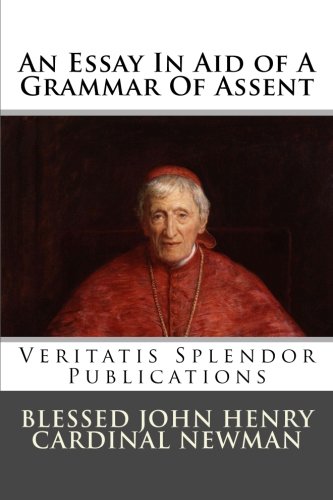Verwandte Artikel zu An Essay In Aid of A Grammar Of Assent

Inhaltsangabe
An Essay in Aid of a Grammar of Assent is John Henry Newman's book on the philosophy of faith, his seminal work. While it was completed in 1870, Newman revealed to friends that it took him 20 years to write the book. Newman's aim was to show that the scientific standards for evidence and assent are too narrow and inapplicable in concrete life. He argued that logic and its conclusions are not transferable to real life decision making as such. As a result, it is inappropriate to judge the validity of assent in concrete faith by conventional logical standards because paper logic is unequal to the task. "Logic is loose at both ends," he said, meaning that the process of logic initially depends on restrictive assumptions and is thus unable to fit its conclusions neatly into real world situations. The Grammar was an apologia for faith. Newman was concerned with defending faith as a legitimate product of rational human activity—that assent is not contrary to human nature. He wrote this book against the background of British Empiricism which restricted the strength and legitimacy of assent to the evidence presented for it. John Locke, David Hume and John Stuart Mill, a contemporary of Newman, were the primary Empiricists that Newman was engaged with philosophically.
Die Inhaltsangabe kann sich auf eine andere Ausgabe dieses Titels beziehen.
Reseña del editor
An Essay in Aid of a Grammar of Assent is John Henry Newman's book on the philosophy of faith, his seminal work. While it was completed in 1870, Newman revealed to friends that it took him 20 years to write the book. Newman's aim was to show that the scientific standards for evidence and assent are too narrow and inapplicable in concrete life. He argued that logic and its conclusions are not transferable to real life decision making as such. As a result, it is inappropriate to judge the validity of assent in concrete faith by conventional logical standards because paper logic is unequal to the task. "Logic is loose at both ends," he said, meaning that the process of logic initially depends on restrictive assumptions and is thus unable to fit its conclusions neatly into real world situations. The Grammar was an apologia for faith. Newman was concerned with defending faith as a legitimate product of rational human activity—that assent is not contrary to human nature. He wrote this book against the background of British Empiricism which restricted the strength and legitimacy of assent to the evidence presented for it. John Locke, David Hume and John Stuart Mill, a contemporary of Newman, were the primary Empiricists that Newman was engaged with philosophically.
„Über diesen Titel“ kann sich auf eine andere Ausgabe dieses Titels beziehen.
- VerlagCreateSpace Independent Publishing Platform
- Erscheinungsdatum2016
- ISBN 10 1540758923
- ISBN 13 9781540758927
- EinbandTapa blanda
- SpracheEnglisch
- Auflage1
- Anzahl der Seiten394
- HerausgeberBoer Sr. Paul A., Veritatis Splendor Publications
- Kontakt zum HerstellerNicht verfügbar
Neu kaufen
Diesen Artikel anzeigenEUR 11,87 für den Versand von Vereinigtes Königreich nach Deutschland
Versandziele, Kosten & DauerSuchergebnisse für An Essay In Aid of A Grammar Of Assent
An Essay In Aid of A Grammar Of Assent
Anbieter: Revaluation Books, Exeter, Vereinigtes Königreich
Paperback. Zustand: Brand New. 1st edition. 394 pages. 9.61x6.06x0.94 inches. This item is printed on demand. Bestandsnummer des Verkäufers zk1540758923
Anzahl: 1 verfügbar

